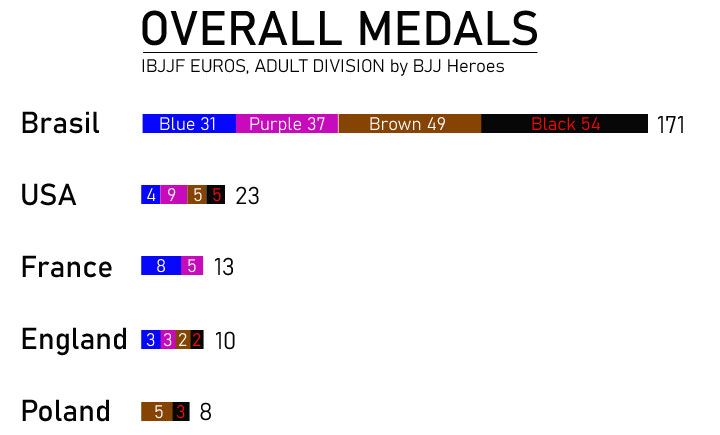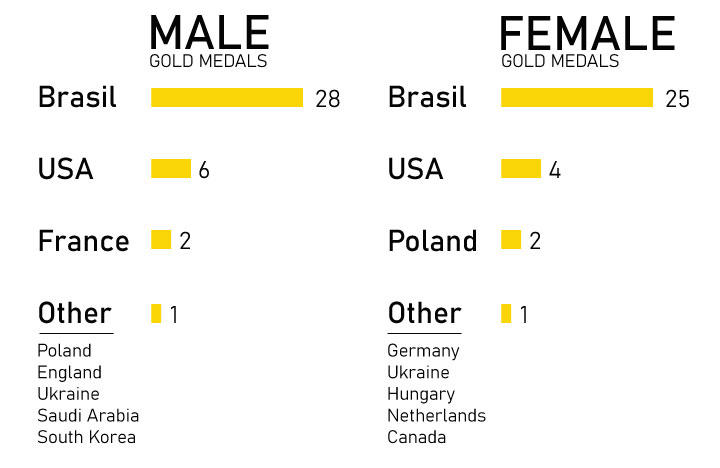Even though so many high-profile figures of no-gi jiu-jitsu continuously push the narrative that the kimono is dead in our sport, gi jiu-jitsu tournaments keep growing in numbers every year, as observed over the past year in championships such as the IBJJF Worlds, Pans, World Masters/Jiu-Jitsu Con, CBJJ’s Brasileiro, AJP Abu Dhabi World Pro and, more recently, today’s subject, the European Championship, which was held over 7 Days, from January 20-27, 2024.
One of the biggest draws for the European Jiu-Jitsu Championship produced by the International Brazilian Jiu-Jitsu Federation (IBJJF) lies in the tournament’s ability to generate one of the biggest concentrations of nationalities in the sport due to the advantage of a European location and the continent’s looser guidelines regarding traveling. From China to the United States, many of the globe’s top athletes go to battle every year on the mats at this event, as such, this tends to be a good barometer as to who are the strongest nations in the sport, at all belt levels.
Although Brazil has always been a powerful force in jiu-jitsu, 2024 set the most dominant performance by a Brazilian squad at the European Championship since we started accounting for these records. 55% of medals in the combined blue belt (adult) to black belt (adult) divisions ended in the South American territory, with the United States taking a distant second at 7%. Many of these results came down to the dominance of Brazilian squads like Fratres, who took 33 medals, DreamArt with 17, and GFT (16), which skewed the scales in this country’s favor.

The Brazilian dominance was asserted across every belt level and sex category, although with a stronger showing in the male division at 62%, with females earning 52% of the medals on offer at the Euro tournament.

USA’s athletes conquered second place overall and also in the male and female division with France earning a solid third as well across the board.
French grappling has gained plenty of traction over the years and this performance by Le Bleu of jiu-jitsu is not simply explained by the tournament being held in Paris. The French have been among the top countries in Europe for a long time, consistently placing in the top 10. The Lions of England did fail to make the top 3 countries in terms of medals despite the strength of the British grappling circuit, which is looked by many as the main hotspot for jiu-jitsu in Europe.
Another interesting take from this medal tally is how Japan, a country that was once regarded as the #3 in the world, behind Brazil, and the US, only achieved one medal at the IBJJF Euros.
Below is the total of medaling countries and the sum of their medals at the European Championship 2024 (adult division, blue to black belt).
171 medals: Brazil
23 medals: USA
13 medals: France
10 medals: England
8 medals: Poland
7 medals: Sweden
5 medals: Netherlands
5 medals: Ukraine
5 medals: Canada
5 medals: Finland
4 medals: Portugal
4 medals: Saudi Arabia
4 medals: Switzerland
3 medals: South Korea
3 medals: Hungary
3 medals: Belgium
3 medals: Germany
2 medals: Australia
2 medals: Norway
2 medals: Italy
1 medal: Greece
1 medal: Estonia
1 medal: Spain
1 medal: Slovakia
1 medal: Bahrain
1 medal: Angola
1 medal: Scotland
1 medal: Japan
1 medal: Marroco
1 medal: Denmark
1 medal: Ireland
1 medal: Argentina
1 medal: Czech Republic
1 medal: Wales
1 medal: Austria
















Hi.
I was just wondering what I would need to do to get a profile on your site?
My name is Kane Gehling and I’m a 2nd degree black belt from Adelaide, Australia. (I can send you a copy of my Ibjjf Certificate).
I’m older now (40) but had a good record of competion here and in Japan for over the last 10 years.
I’ve also coached and graduated some great competitors over the years including Declan Moody to black belt in 2019.
I would love to get a profile on your site and can provide any further information you need.
Cheers
Kane Gehling